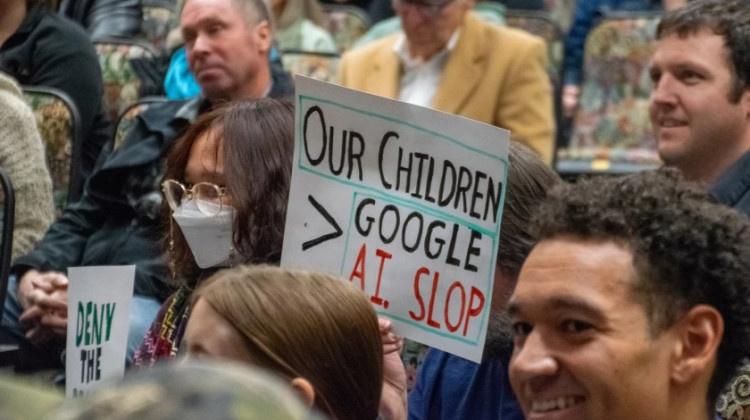
Lafayette Police officials say hate crimes don't happen frequently in the city, but are hard to solve when they do.
Charlotte Tuggle/WBAAIndiana is one of five states without a hate crimes law. After a Carmel synagogue was vandalized with anti-Semitic graffiti this summer, the push to pass one was re-energized. But a hate crimes law may not help police or prosecutors.
It’s a number Lafayette Police Chief Pat Flannelly disputes, but according to the Indiana State Police, the City of Lafayette experienced eight hate crimes in 2017. Police have yet to solve any of them.
Flannelly says the city has seen two hate crimes so far this year, too.
“We’ve run the leads that we have up until a point where there are no more leads,” Flannelly says. “It doesn’t mean that we won’t continue the investigation if we get further information, but absent further information, we’re kind of at a stalemate.”
Lafayette’s Captain of Detectives Kurt Wolf says besides getting the perpetrator to confess, it can be difficult to find them.
“Basically, if it was not witnessed, we would have to come up with some proof that would tie that person to that crime,” Wolf says. “That could be physical evidence that we could possibly match up, but usually that’s very hard to find, especially with vandalisms or spray-painting.”
So, he says feedback from the community can be one of the most helpful tools the department has. And if a hate crimes law is passed, Wolf says it won’t really change how these incidents are investigated.
“They’re our eyes and ears out there,” Wolf says. “They see what’s going on, they may know a lot more of the people that could be involved in this type of situation.”
The Indiana General Assembly has talked about a hate crimes bill during its last few sessions, but it’s never even gotten a hearing. Sen. Ron Alting (R-Lafayette) says this year may be a turning point.
“It’s a disgrace,” Alting says. “I’m hoping that this year, under new leadership in the Senate, that we’ll finally get this bill and get it through. There should never, ever be discrimination.”
Even without a law in place, states still report hate crimes to the FBI, as required by the Hate Crime Statistics Act of 1990. Seventy-eight bias crimes were reported in Indiana in 2017. That’s 2.7 hate crimes per 100,000 people, higher than the country’s latest average of 2.1 per 100,000.
The Indiana State Police also collects bias crimes data, though it can be nebulous because crimes are often re-classified. Still, Indiana State Police Sgt. Jerry Holeman says it’s important to track hate crimes across the state.
“We’re often reactive as law enforcement,” Holeman says. “But if we do have the stats coming in and it can prove that we do have an issue with certain bias crimes – maybe a certain religion, a certain race in our area – then we can be a little more proactive and try to educate the public.”
Actually charging people is up to county prosecutors. And Tippecanoe County Prosecutor Pat Harrington says in Indiana, bias can be argued as an aggravating factor during a sentencing hearing, after someone is convicted.
For example, someone convicted of battery faces anywhere from three to 16 years behind bars. And if they made a hateful remark to a witness, Harrington says they’ll likely face more jail time.
“We can bring that witness, or just the statement, into the judge at the sentencing and if the judge finds, ‘I believe that’s accurate,’ then the sentence is going to go toward the higher range of 16 as opposed to the lower range of three,” Harrington says. “And we didn’t have to prove it to get the actual conviction. We have the conviction, now we’re just arguing why the sentence should be increased.”
If Indiana had a hate crimes law, prosecutors such as Harrington would have to prove bias beyond a reasonable doubt to invoke it. He says the state doesn’t need a new law to increase the penalties for hate crimes.
“So we actually get the benefit of that in Indiana right now without having the exact law written like other states,” Harrington says. “Some of us believe that if we go to having, in writing, that you have to prove it, it may be counterproductive to the successes we’re having right now in Indiana.”
And what’s more, judges already have wide leeway to decide how much of a potential sentence a criminal will serve.
But the “successes” Harrington talks about might be an overstatement. In the Indiana report, about 80 percent of 2017’s hate crimes are listed as “alleged crimes” instead of “charged.” That means four of every five are still unsolved. The number also doesn’t reflect how many more crimes might be classified as bias-motivated if such a classification existed in state law.
The other states without a bias crime law on the books are Arkansas, Georgia, South Carolina and Wyoming.
 DONATE
DONATE








 Support WFYI. We can't do it without you.
Support WFYI. We can't do it without you.